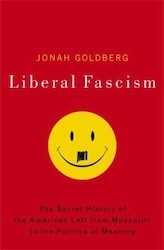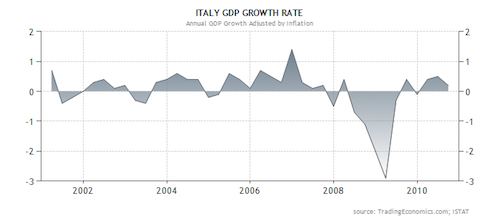Matthew Yglesias's Blog, page 2449
January 15, 2011
Demographics of Italy
How is this supposed to play out in 2040?:

Here's the US by way of comparison. I'm thinking Italians would do well to start feeling a lot more positive about immigration.


Medicare Option

Here's an idea. Right now, if you're over 65 in America and you have a health problem, you're entitled to have the federal government pay for your treatment. These treatments are often expensive, and are also often a pain-in-the-ass to undergo. What if in addition to being entitled to get the treatment you were also entitled to just pocket the money. Maybe at the margin you'd rather have a vacation in Paris and a shorter life than spend more time in the hospital.
Obviously, there are some implementation issues here. But in principle it seems like it would increase utility while freeing up real health care resources (doctors' time, hospital beds, etc.) where such resources are scarce, while reducing health care industry rents in places where they're plentiful.


January 14, 2011
Endgame
Do it well:
— Gen Y likes walkable urbanism, but as I never tire of pointing out it's generally illegal to build it.
— Senator Mike Lee thinks child labor laws are unconstitutional.
— "Structural" unemployment is only a small share of the total.
— Is China already number one? (I think there are some conceptual problems with using PPP to compare aggregate output).
M.I.A., "Bad Girls".


Tunisia

I haven't said anything about Tunisia because:
(a) what do I know about Tunisia? and
(b) everyone knows dictatorships are only bad when they're also geopolitical adversaries of the United States.
But Tyler Cowen observes that as far as dictatorships go, Zine el-Abidine Ben Ali had one of the better ones:
I've never been to Tunisia, but from readings I've found the country especially difficult to understand. They've had a corrupt autocracy for a long time, but some areas of policy they get (inexplicably?) right. And usually they are by far the least corrupt country in the Maghreb. Dani Rodrik called the place an unsung development miracle. Maybe that was exaggerating but for their neighborhood they still beat a lot of the averages and they've had a lot of upward gradients. They've also made good progress on education.
I see this as a reminder that dictatorship is basically incentive-compatible. You'd much rather be a member of Singapore's governing elite than of North Korea's. That's not to say authoritarianism is good, but simply that even authoritarians ought to be interested in improving public policy. The more growth your country experiences, the bigger the pie you have to skim off.


What's the Vitriol About?

Paul Krugman says there's no room for middle ground in American politics:
One side of American politics considers the modern welfare state — a private-enterprise economy, but one in which society's winners are taxed to pay for a social safety net — morally superior to the capitalism red in tooth and claw we had before the New Deal. It's only right, this side believes, for the affluent to help the less fortunate.
The other side believes that people have a right to keep what they earn, and that taxing them to support others, no matter how needy, amounts to theft. That's what lies behind the modern right's fondness for violent rhetoric: many activists on the right really do see taxes and regulation as tyrannical impositions on their liberty.
There's no middle ground between these views. One side saw health reform, with its subsidized extension of coverage to the uninsured, as fulfilling a moral imperative: wealthy nations, it believed, have an obligation to provide all their citizens with essential care. The other side saw the same reform as a moral outrage, an assault on the right of Americans to spend their money as they choose.
Jon Chait agrees and says this kind of right-wing Randianism is "the question that is driving most of the contemporary divide."
I sympathize with this argument, but as I said yesterday the strange thing is that so much of this furious opposition to activist government appears to be make-believe. The American Enterprise Institute did a poll of self-identified conservatives and found that "only 3 percent of respondents favored reforming Social Security and Medicare." The 2010 elections put a lot of new conservative governors in office, and I'm guessing that exactly zero of them will abolish mandatory minimum parking requirements in their states. Nor do I expect to see Rep Frank Lewis slash farm subsidies.
It's a bit puzzling. The gap is really not just between conservatives and non-conservatives, but between conservatives' self-image and the reality of their program. Paul Ryan, for example, can't quite seem to decide if he wants to slow the growth of Medicare while maintaining a credible safety net for elderly Americans (in which case his "roadmap" proposal is the starting point of a discussion) or if he's an Ayn Rand devotée who's trying to liberate America from enslavement at the hands of the welfare state. Indeed, he doesn't really even seem to see that these are different ideas!


The Stopped Clock
Reading over the just-released full 2005 FOMC transcripts I note that Kansas City Fed President Thomas Hoenig consistently seemed to feel that his colleagues were underestimating inflation risks.
I wonder if it ever bothers the longest-serving Fed President that this is what he always says and that he's never been right. If I kept making the same prediction, year after year, for two decades and was invariably wrong I'd start to wonder. Doesn't this bother him? Doesn't it bother the Kansas City Fed's Board?


Public Services For the 21st Century

Lydia DePillis has an excellent profile of DC Chief Librarian Ginnie Cooper who's led the drive to refurbish the physical plant of DC's libraries and turn them into appealing public spaces.
This does make me think of some broader issues. Libraries are, along with the Postal Service, an example of a kind of public service that I think is a bit weirdly focused on 18th century technological conditions. The big idea of a library is that there's a lot of deadweight loss involved in exclusive private ownership of bigs. After all, at any given time the vast majority of privately owned books are just sitting around on bookshelves. By establishing book-sharing systems, it's possible to achieve massive efficiency gains. This can be done by private associations (to wit: universities) but it can also be usefully performed at the municipal level.
We're moving into a world, however, where there's some much juicier low-hanging fruit in the realm of book-related deadweight loss. The DC Public Library system is, wisely, getting in on the e-book game. But e-books that are under copyright come with tons of restrictions. Public domain e-books can, by contrast, be distributed essentially for free to as many people as want to read them. As of January 14, 2011 devices capable of reading e-books are basically a niche product for prosperous people but that's obviously not going to be the case forever. We're on the verge of a world where every citizen can get nearly instant access to essentially every public domain book for free.
That means that funds—whether they're funds from the government or from charitable sources of library funding (again, think universities)—expended on acquiring the rights to works and releasing them to the public domain could be associated with huge welfare gains. As an even cheaper alternative, we could return to America's traditional practice of time-limited copyrights that ensured that the passing of each year entails a new year's worth of works entering the public domain. Relatively few people understand that in recent years Congress has changed its practice and begun routine retroactively copyright term extensions that guarantee that no new works will become free to the public. If Chris Christie decided to save money by removing a couple of decades worth of works from New Jersey's libraries, I bet people would get pissed about that.


Changing the Tone

By request from Joseph Benaiah Cox:
As someone who frequently points out that Jonah Goldberg is a moron unsuited for any work in the public, let along public intellectual debate, how do you feel about calls to tone down the rhetoric? While obviously yours is not violent rhetoric, it probably doesn't make anyone feel too charitable. I enjoy your candor, but as someone who has a blog award for bravery named after him I wonder if you could chew on your own role in the public discourse. Do you regret things you have said? Do you think that you contribute to the devil shift?
I have definitely said some things over the years which I regret. But I draw a distinction here. I don't think people should pretend to like people they dislike or avoid saying what they mean. But I do think people should be careful to avoid a certain kind of tendentious rhetoric. Some of the participants in our political debate are quite stupid, some are corrupt, some are dishonest, and some combine multiple unattractive qualities.
What should be avoided is the tendency to dramatically overstate the ideological stakes in our political debates. The choice between Democratic candidates and Republicans ones is important and has important consequences. But in the grand scheme of things, you're seeing what's basically a friendly debate between two different varieties of the liberal tradition. I think efforts to elide the difference between the religiously inflected populist nationalism of George W Bush and the religiously inflected populist nationalism of Mullah Omar are really absurd, as are the efforts by Glenn Beck to elide the difference between the progressive income tax and Joseph Stalin. This stuff is mostly unserious, but I also think it's potentially dangerous. If you really thought prominent American politicians were plotting to fundamentally subvert the American constitutional order tand supplant it with a totalitarian dictatorship, you'd be prepared to countenance some pretty extreme countermeasures.
The problem here isn't really about "civility" or being nice, it's about accuracy and not treating your audience like you respect them. Beck thinks of his audience as marks, which is just plain wrong, and some day I'm afraid the con may lead someone to do something equal in craziness to the yarn Beck is spinning.


Recent Italian Economic History
I find myself periodically blown away by new representations of Italian macroeconomic performance:

They had two extra recessions! Now this in part reflects the demographic situation which points toward population shrinkage in the near future. But Italy has an extremely high debt:GDP ratio and the debt:GDP ratio doesn't care about evaluating your data in per working age citizen terms. The country's not that high on the list for a short-term sovereign debt crisis, but I don't really understand what the medium-term resolution here is supposed to be.


Renminbi Denominated Hedge Funds

(my photo available under cc license)
Sam Jones reports for the FT:
Pharo Management is becoming the first hedge fund manager to offer shares in its investment vehicles denominated in renminbi.
The move for its flagship fund underscored the extent to which the future of the US dollar and the rising power of the Chinese currency are becoming concerns for the markets' most sophisticated investors.
To give this an alternative interpretation, rapid economic growth in China is creating the largest pool of suckers the world has ever seen. Real world individuals exhibit bounded rationality, and lots of Chinese people who may have been extremely smart at getting rich in China's industrial revolution may be quite foolish about their decisionmaking regarding complicated western financial products. American rich people are much better-positioned than Chinese rich people to avoid getting ripped off, and yet a large number of people were taken in by Bernie Madoff's rather crude fraud. China is a treasure trove of potential marks and Pharo is getting in on the game.


Matthew Yglesias's Blog
- Matthew Yglesias's profile
- 72 followers



